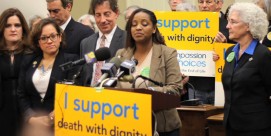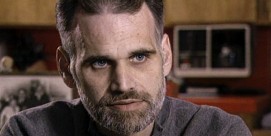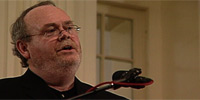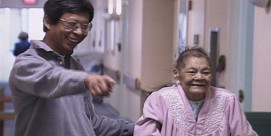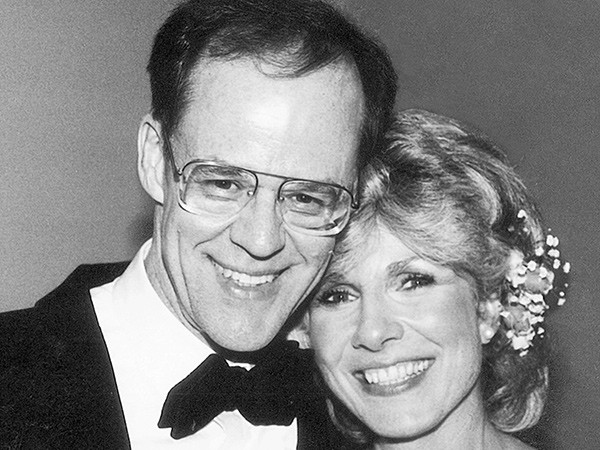 BOB ABERNETHY, host: There’s a wrenching debate underway about the treatment of the terminally ill. Many voices, some of them deeply religious, strongly oppose helping anyone end his or her life. Others approve it. In June, California becomes the fifth state to allow terminally ill patients to end their life with the help of a doctor’s prescription. We spoke about end-of-life treatment with NPR host Diane Rehm, who has written a book, On My Own, about her family’s struggle with the issue. Rehm’s husband, John, died in 2014 after a long battle with Parkinson’s disease. Toward the end of his illness, John asked his doctor to help him die.
BOB ABERNETHY, host: There’s a wrenching debate underway about the treatment of the terminally ill. Many voices, some of them deeply religious, strongly oppose helping anyone end his or her life. Others approve it. In June, California becomes the fifth state to allow terminally ill patients to end their life with the help of a doctor’s prescription. We spoke about end-of-life treatment with NPR host Diane Rehm, who has written a book, On My Own, about her family’s struggle with the issue. Rehm’s husband, John, died in 2014 after a long battle with Parkinson’s disease. Toward the end of his illness, John asked his doctor to help him die.
DIANE REHM: John began the conversation by saying to the doctor, “Dr. Freed, I can no longer stand, I can no longer feed myself, I can no longer do anything for myself, and frankly, this is a life not worth living. I am ready to die.” The doctor said very simply, “John, I do understand your feelings, and I honor your feelings, but in the state of Maryland I am forbidden from in any way helping you morally, ethically, any other way. I cannot help you.” My daughter on the phone said, “But Dad, we can keep you comfortable,” and he said, “I do not want comfort.” I mean, John was a very proud man, and for the prior six months or so he had had to have somebody there constantly to do things for him, to help him bathe, to help him move from bed to bathroom, help him eat, and he said, “I am falling into further and further degradation, and I don’t want to go any further.” So comfort was certainly not what he was after.
ABERNETHY: On June 14, 2014, John Rehm began to refuse any food or drink. He died 10 days later. After her husband’s death, Diane continued to host “The Diane Rehm Show.” She faced criticism for speaking publically about her support for the Death with Dignity movement. Diane now discloses her support for the movement when the topic is discussed on her show.
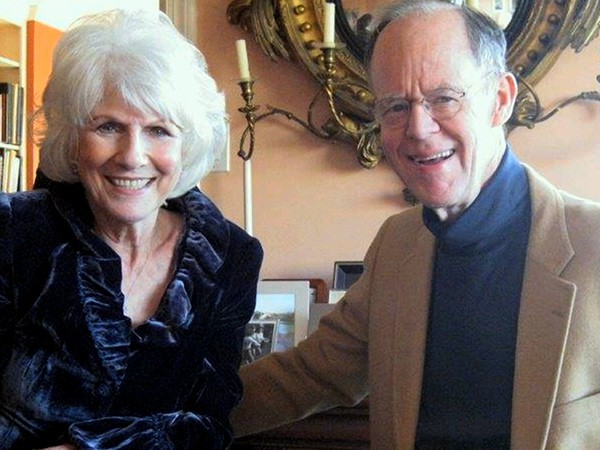 REHM: It wasn’t until an article in the Washington Post came out with the headline “Rehm Becomes Outspoken Advocate for the Right to Die.” The word “advocate” was what everybody picked up on, when in fact I had simply gone to speak of my own experience. I am not suggesting, nor would John ever have suggested, that his way out is the way for everyone. I think what we both believe is that there should be choice, and that if one chooses palliative care, if one says my God has said to me when my time comes, my time will come, according to his/her will, I think that’s beautiful. I think I face each day with a brightness of spirit and optimism. The knowledge that not only my book but John’s death, Brittany Maynard’s death, the death of hundreds of other people in Oregon who have chosen the way they wish to die, that will bring the whole subject into family homes. People need to talk about this issue. Doctors need to be taught about this issue. The whole idea of doctors being taught about helping to keep people alive but not being taught how to listen to those who are ready to die—that seems to me sad and misguided.
REHM: It wasn’t until an article in the Washington Post came out with the headline “Rehm Becomes Outspoken Advocate for the Right to Die.” The word “advocate” was what everybody picked up on, when in fact I had simply gone to speak of my own experience. I am not suggesting, nor would John ever have suggested, that his way out is the way for everyone. I think what we both believe is that there should be choice, and that if one chooses palliative care, if one says my God has said to me when my time comes, my time will come, according to his/her will, I think that’s beautiful. I think I face each day with a brightness of spirit and optimism. The knowledge that not only my book but John’s death, Brittany Maynard’s death, the death of hundreds of other people in Oregon who have chosen the way they wish to die, that will bring the whole subject into family homes. People need to talk about this issue. Doctors need to be taught about this issue. The whole idea of doctors being taught about helping to keep people alive but not being taught how to listen to those who are ready to die—that seems to me sad and misguided.

 BOB ABERNETHY, host: There’s a wrenching debate underway about the treatment of the terminally ill. Many voices, some of them deeply religious, strongly oppose helping anyone end his or her life. Others approve it. In June, California becomes the fifth state to allow terminally ill patients to end their life with the help of a doctor’s prescription. We spoke about end-of-life treatment with NPR host Diane Rehm, who has written a book,
BOB ABERNETHY, host: There’s a wrenching debate underway about the treatment of the terminally ill. Many voices, some of them deeply religious, strongly oppose helping anyone end his or her life. Others approve it. In June, California becomes the fifth state to allow terminally ill patients to end their life with the help of a doctor’s prescription. We spoke about end-of-life treatment with NPR host Diane Rehm, who has written a book,  REHM: It wasn’t until an article in the
REHM: It wasn’t until an article in the 